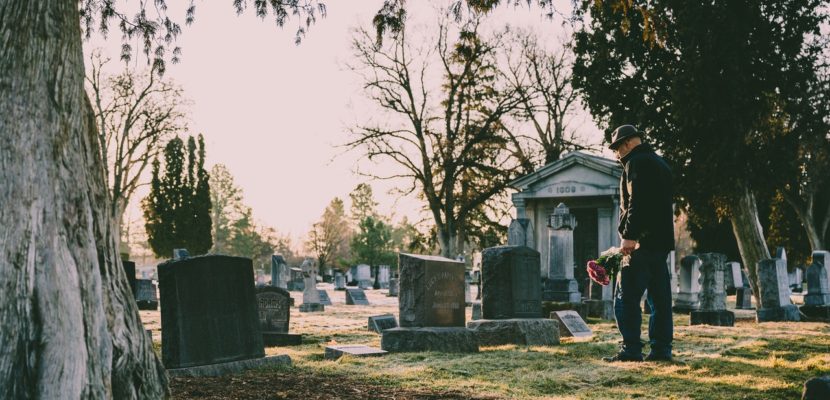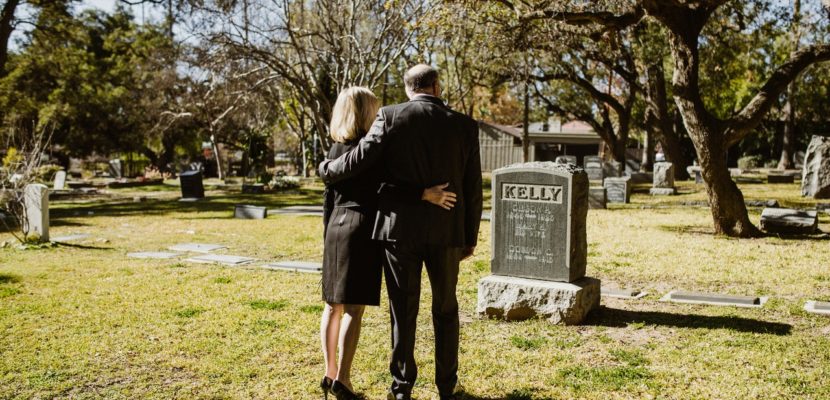A 50/50 chance, to any gambler, is a pretty good bet. But did you ever stop to think that if you are in a significant relationship, there is a 50/50 chance that you will eventually grieve the loss of your partner?
Listen to some of the stories of people who experienced the loss of a spouse.
“I would go to work and it would seem that everything was the same as it had always been. But then I would come home. WOW! Just walking into that empty house. Nobody to say hello or ask me how I got on that day. No delicious aroma of supper in the oven. I had to make my own meal … when I felt like it … and most of the time I didn’t … because I was missing what I had lost … not just my wife, but also the person who used to look after me. That was when it hit me hardest.” Michael
“The days that followed his death were both utterly full and completely empty … full of activity yet empty of life. Much of the time I sleep-walked through the things I had to do, so numb that I was often completely unaware of what was going on around me. I felt like Pinocchio must have felt inside of the whale … cut off from everything that I thought was my life. Then an event or a few spoken words would bring me out of my darkness, only to find myself standing alone and confused on some strange and unfamiliar shore, full of feelings and memories, but also feeling utterly lost.” Robyn
“She was not only my wife. She was also the one who would tell me if my socks matched; if my tie was straight, or if my hair was combed. She was able to tell me with one look if I was talking too much or saying something stupid. She was the one who would remember all the birthdays and special occasions, and all I had to do was sign cards. She was good at all the things I am not good at. So she complemented me and made me more whole. God, I miss her so much. I feel like part of me is missing.” Joe
A common theme among people who have lost their spouse is the debilitating effects of feeling entirely alone and incomplete. The sense of feeling like you have lost an essential part of yourself is both painful and disconcerting. The world suddenly looks like a different place, often odd and distanced. You are not sure how to cope with life in general, and sometimes you may even wonder if you even want to try.
One 68-year-old widow said, “There is no use trying because you can’t get anywhere anyway. I’m so tired all the time. Everything is too much effort.”
Some of the most common feelings and concerns after the loss of a spouse are reflected in the following statements:
I felt like I had lost my best friend
I am angry.
I feel guilty that I didn’t do enough for him/her.
I am afraid.
I worry about lots of things, especially money.
Suddenly I feel very old.
I feel sick all the time.
I think about my own death more frequently.
I seem to be going through an identity crisis.
I feel relieved that his suffering is over, then immediately guilty for feeling that way.
Behind each of these statements is a feeling. To fully understand the effects that the loss of that spouse has on that survivor, we need to understand the dynamics behind each of these reactions. The feeling communicates what the person is missing and offers an opportunity to examine the deficiency and find ways to cope with these responses in a way that will ultimately facilitate healing.
First, it is essential to recognize that healing cannot take place unless you EXPRESS what you are feeling and thinking as a result of your loss. That which cannot be put into words, cannot be put to rest. This is where a support group can play such a vital role for grieving people. The opportunity to talk about the person, their life as well as their death, what you miss about them, your feelings of loneliness, anger, and many others, and to review the final days of their life and your relationship.
Even when there is some ambivalence about certain aspects of the life shared, it is important to verbalize your anger or your regret about what you lost and never had, or about what could or should have been.
There are some very real consequences of not expressing feelings. Studies clearly show that mortality rates are higher among those who do not articulate their grief, and this may also account for the much higher rate of males who die within a year of their spouse, due to the societal norms that make it more difficult for men to express emotions.
Some survivors ask, “How long should I talk about this? What is normal?” This concern is often motivated by the fact that within a few weeks or months of the death, others seem reluctant to talk about it. After all, their life has returned to normal. But the widow or widower needs to talk about it because it just feels unbelievable. Life will never be “normal” again (even though a new definition of normality will be established eventually). So some grieving people need to talk for six months, but for others, it can be two years or longer. Everyone needs and deserves to follow their own timeline.
Over the years, I have noted FOUR situations particularly affecting grieving spouses that require an inordinate amount of personal courage:
1. Coping with persistent unpleasant memories
2. Avoiding certain rooms or situations in the house
3. Experiencing hallucinations where the dead spouse is seen or heard
4. Dealing with their spouse’s personal effects (clothes, tools, etc.)
Unpleasant memories most often relate to the painful images surrounding the death, and the frustration of not being able to “do” anything to change the outcome. Often through a life-threatening illness, a relationship will peak in one direction or another … a good relationship will tend to get better, a poor relationship will tend to get worse … although there are glorious exceptions. This intensity of the relationship prior to the death magnifies the loss, either by the person missing all the things done and shared through the illness or by feelings of regret that they did not do enough. Often the inability of the survivor to “let go” of the image of the person in the present is connected to one or other of these factors.
If the person is avoiding sleeping in their own bed or steering clear of certain areas of the house, this behavior should not be considered unusual or pathological. They are merely protecting themselves from stress. There is a reason for every behavior and perhaps that location is a too painful reminder of the death, or expresses a concern as to “how will I manage”.
Hallucinations (or however we choose to define these experiences) have a wide range of “explanations”. Is it a “visitation of the person’s spirit”, or is it a “product of sensory recall”. I try not to attempt to explain what it may or may not be, but rather to ask how the survivor felt after the experience. And almost always, the person feels reassured, relieved, comforted. If that is the effect, it hardly matters whether it is a dream, a hallucination, or a visitation, and to argue that seems to me to miss the point.
Dealing with a spouse’s personal effects is something many survivors procrastinate over. Sometimes this has to do with an understandably low physical energy and emotional stamina. Because these are “special things” you may not know who to give them to or what to do with them. That is OK.
Do nothing until you are SURE that you feel comfortable with what will happen, even if that takes several months or longer. But when you do decide, ask a friend or family member to assist, or even just to be there and talk to you while you do it. Maybe there will be things that you simply do not want to discard or give away so keep them. Remember, it doesn’t hurt anyone or anything to leave your spouse’s things right where they are. Don’t allow anyone to force you into dealing with things until you are ready, sure, and comfortable.
So far we have looked at some of the unique challenges surrounding the loss of a spouse.
Now we turn to examine how the surviving individual must convert the mourning process into a nurturing process as they seek to rebuild and reorganize a life where they feel like half of them is missing.
I believe that an often overlooked aspect of losing a spouse is the change in identity the survivor experiences. We tend to define ourselves by our relationships, our work, our activities, and our involvements. Many couples define themselves as just that … a couple. It is not ME, it is WE. Admittedly the degree of change will be determined by the complexity of the relationship. But we really cannot understand what any person has lost until we understand the relationship that was shared and is now lost. What is missing from that relationship is really what the person is grieving. And, obviously, every single relationship is unique, with different dynamics and interactions.
So it is reasonable to say that the more dependency the person had on their spouse and the role as husband or wife, the greater the void now that the role is no longer there.
In other words, the surviving spouse not only grieves the person who has died, they also grieve the role that is lost. They suddenly find themselves cast into the role of being a “widow” or a “widower”, a role they neither relish nor desire. The question becomes, “Who am I now?” I still feel like the same person, but my roles in the family, community have changed. This, by the way, is often why a grieving spouse will find comfort in getting back to work because at least THERE, their role remains somewhat “constant” in that familiar context.
Listen to the comments of one widow:
“For almost a year after Jim’s death, I thought of myself as only his husband. I had invested my whole self in him.
I had to think, NO, I didn’t give him all I had, I LOANED it to him. Now I needed to reclaim it, take it back, because I needed it for myself.”
Of course, reclaiming one’s self is only possible when you know who your “self” IS. Before you are able to reclaim, you have to identify and redefine, “Who am I NOW” in the light of my loss. The W of WE has to become the M of ME … but turning a W to an M means turning everything upside down, and that is exactly what the widowed person may feel.
So how can a grieving widow or widower redefine themselves? I think it is inextricably linked to interests and experiences. People who get involved, whether in necessary tasks like looking after children, family or work, or by involvements in the community, groups, activities, find that these things increase self-esteem and energy as they enhance the person’s identity.
But let’s take a walk on the wild side. Although it is grossly unfair, the widower is often viewed as more “socially acceptable” than the widow. Because the percentage of widows greatly exceeds that of widowers, males are regarded as “eligible” whereas females are regarded as a “threat”. Accordingly, hostesses more frequently extend social invitations to males than to females, so a widow’s social life may not be as jam-packed.
On the other hand, because many men rely on their wives to arrange social activities, after her death it may be difficult to go out without her, to develop social skills, or to put forth the effort that he will need to enjoy the pleasure of other people’s company. Again, social clubs or support groups can provide a good bridge to help the person develop skills, or at least feel more comfortable in such situations. Michael, almost a year after his wife died, said:
“I think the difference between a male’s grief and that of a female is a cultural thing. Men are not as social as women. I mean I have friends, but when we sit down for a drink or something we talk about business or sports or activities. Men aren’t really taught to relate their feelings or emotions, and certainly not their vulnerabilities. So when my wife died, my friends didn’t know what to say, as if they were afraid to ask me how I was feeling.”
Physical health is another area that concerns many people. Suppressed emotions can contribute to physiological symptoms, which can have serious consequences. Health doesn’t just happen! It involves exercise, good nutrition, avoiding excessive intake of caffeine, alcohol, or drugs. Some survivors live on coffee or snack foods and rarely eat a balanced meal.
“The last thing in the world I wanted to do was eat. Everyone kept urging me to “eat something” so if someone was there or watching me, I would eat something to please them. But when I was alone, I ate nothing. In the first month after my husband’s death, I lost 20 pounds. It wasn’t till I started walking daily with my neighbor that my normal appetite returned.”
Insomnia is one of the major symptoms resulting from conjugal bereavement. This can be aided by what we do and what we consume in the hours before going to bed. But many males experience other physical symptoms. Again Michael brings an important insight:
“I’ve noticed some changes in my health. Particularly in my stomach … pains, indigestion, and other symptoms, I won’t mention in polite company. My doctor put me through tests, which I think was a good thing to do, but he indicated that often men experience physiological reactions to the emotional stress of grief. That doesn’t minimize their importance. Maybe it’s easier for us to say “I have a pain in my stomach” than it is to say, “I have an ache in my heart.” But whatever it is, it is important to pay attention to the message.”
It may seem strange, but several people have reported to me how changing their physical environment has helped their emotional state. We should all from time to time look around our environment … at home, at work. Many times that can reflect our emotional state. A cluttered, untidy, or dismal environment can often reflect a state of mind. But the opposite is also true.
Change usually happens from the inside out rather than the other way. The more you do to enhance your environment, making it cheerful and pleasant, the more your emotional health will be positively influenced.
While everyone is different, I found after my own wife died, and I was left to raise my two young sons, that I had to carefully arrange the surroundings in my home in order to better cope. I put lots of colorful and happy things in the kitchen because that was where I had my biggest struggles after her death. I put positive, inspiring posters and items in the bedroom because that was where I felt most lonely. I had ONE room where I had pictures and artifacts of our life together, and when I wanted to think about her, that is where I would go. When I left that room, I closed the door and focused on all the tasks I had to get on with.
Add color, brighten the place, tidy up a space for yourself, buy a new chair … the ways to make your daily living more pleasant are innumerable and the positive impact on your emotional well-being will be tangible.
There is of course no definite point at which the grieving process is complete. Can we ever say, “I have completely healed from the loss of my spouse”? Who knows!
But as we redefine ourselves; as we relinquish old roles and establish new ones; as we develop increasing confidence in our social outlets that satisfy personal needs and coincide with our interests; as we become more able to
talk about our loss with relative ease; as we become able to be involved in an activity without being plagued by painful memories and images, as we find ourselves more able to reach out to others, and not be afraid to have fun and even to laugh again; you will be reassured that healing is being reaffirmed.
But it does take time. As one lady put it:
“A year was a big event for me. But once I got through that, I felt like I didn’t have to look back. Now I could look forward to seeing what I could do with what I had left. So I asked myself “What am I going to do with the rest of my life?” I want to do something significant but I’m not exactly sure what just yet. For the first time in my life, I can do whatever I want and I plan to make the most of it.”
And why not?








